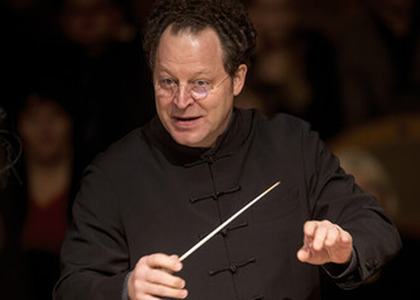> Interviews

Interview with conductor John Axelrod
Together with the Radio National Orchestra and cellist Răzvan Suma, you are going to perform Franz Liszt's "Preludes" symphonic poem no.3, Max Bruch's "KolNidrei" for Cello and Orchestra op.47, Richard Strauss' Romance in F major for Cello and Orchestra and Symphony no. 4 fromPyotrIlyich Tchaikovsky's works. What do you think of this musical programme?
The Radio National Orchestra is a virtuoso ensemble that can perform anything in a wonderful way. We are like a family, we know one another well, so there is trust on both sides. These extremely popular works are, at the same time, very difficult opuses of the fundamental repertoire. Of all of Liszt's works, the "Preludes" symphonic poem is probably the most famous of this genre; it stands out through the majestic quality of the music and its triumphant sonorities. Both this work and Tchaikovsky's Fourth Symphony share a similar theme - destiny: life as a prelude for something greater, while Tchaikovsky's symphony talks about fate and the meaning of life. The Fourth Symphony is one of the best opuses in symphonic literature. In order to give a convincing, emotional performance,it requires perfect control and, at the same time, freedom . Richard Strauss' Romance for Cello and Orchestra and, above all, Bruch's "Kol Nidrei", performed now,right after Yom Kippur, a holiday which involves uttering the "Kol Nidre" prayer, become, thus, incredibly relevant, given the current geopolitical situation in the world. But music is timeless and universal in itself, and it is not necessarily connected to a particular geopolitical space. We are lucky to have an absolutely fantastic soloist - so it is going to be a programme which the audience will enjoy and which shall echo through time.
You havementioned the bond you have with the Radio National Orchestra. How has this relationship developed?
I am also the principal conductor of the The Bucharest Symphony Orchestra, a project-orchestra made up of musicians from Bucharest, among whom many are part of the Radio National Orchestra. That is how we truly got to know one another. When I conducted the Radio National Orchestra in a concert performance of Tchaikovsky's "Pathetique" Symphony, I was already familiar with many of the musicians, which was an advantage.Like in any other relationships, making music together is all about trust. Once trust and closeness develop, you can go further and gain a better understanding of what music is;through music, you can sometimes ask for what you would not normally require of the musicians you don't know. And, most importantly, the quality of the Romanian musicians is known worldwide. We all know that Romanian musicians are some of the best in the world, they are part of renowned orchestras everywhere. That is why having some of the best musicians in Romania perform together in the Radio Orchestra is a dream come true. I am glad to be back in Bucharest - it is like a far-from-home home for me. Every time I get the chance to make music with these musicians, which happens quite often, fills me with joy.
You are also passionate about cooking and wine. How do conducting, food and fine wines -your great interests - come together?
It is a question which starts a long discussion. I worked in the wine industry before becoming a conductor, and my interest in wine has been constant, I have never lost it, not even as a conductor, for wherever I travel, I am looking for good quality food and wine - which is something you definitely find in Romania. My cooking videos from "The conductor's kitchen" series often present Italian recipes, since I love this cuisine. I got the idea from the French expression "chef d`orchestre", which means conductor. As far as wine is concerned, one could say that the way in which we describe and talk about music is similar to the way in which we describe wines - we talk about harmony, structure, balance, complexity, sweetness, darkness. All these descriptions and various colours which can be assigned to music can also apply to wine. What is more, cooking has a lot to do with the idea of tempo - a cook has to prepare a recipe in five or ten minutes, or prepare three courses at the same time. The same goes for a musical piece, which is structuredby means ofa tempo and depends on it. There is a beginning, an end, and the music which is played in between; every single anacrusis leads to the next beat and the whole process takes place at a coordinated tempo. So, cooking, wine and music are entwined, sharing similar features. It is a great idea and a real pleasure for me to organize culinary concerts and enjoy food and fine wines with all my friends.
Translated by Mara Scoroșanu,
University of Bucharest, Faculty of Foreign Languages and Literatures, MTTLC, year I
Corrected by Silvia Petrescu














